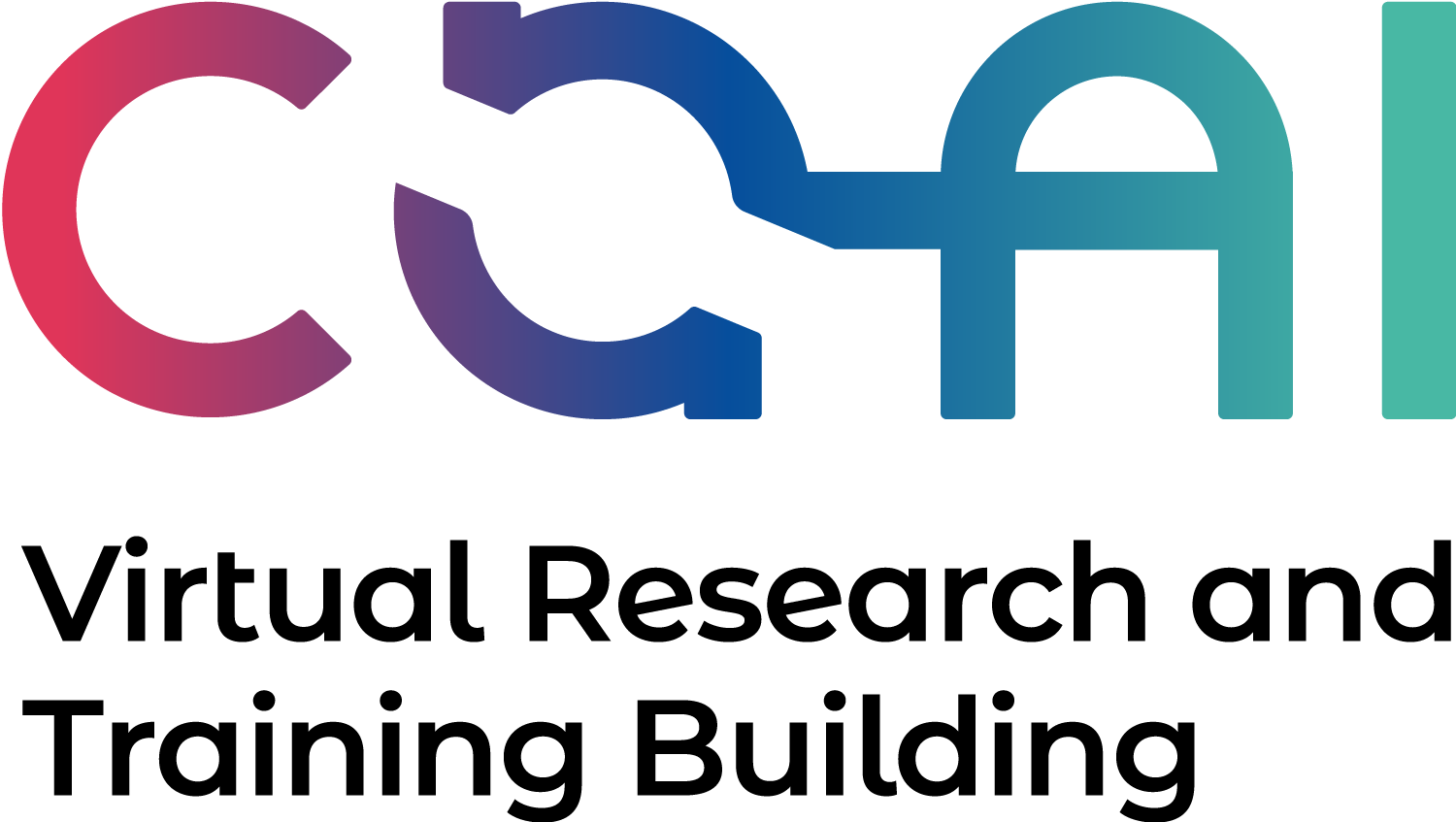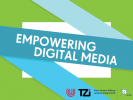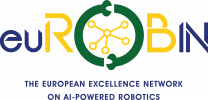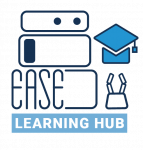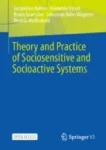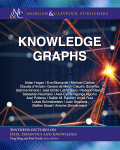Education Floor
Providing open education and training resources is of greatest importance for us at the CoAI JRC. We want to give people worldwide the opportunity to learn about CoAI and related topics.
All educational materials will be accessible from the ViB currently under construction (previewed above). In the meantime, click on the links below to find out more about what we have to offer.
As a highlight, CoAI JRC team members are developing an open interactive textbook. At the moment, it focuses on cognitive robotics. More content on co-constructive AI and human-robot interaction will follow soon!
The CoAI Academy is open to anyone at any level of knowledge. High-school teachers and students and members of the interested public can access talks, interviews and podcasts, and get an overview of ongoing events. Current and future students from our three partner universities can find information about on-site teaching and training courses from our Bachelor and Master curricula and graduate schools.
The CoAI Learning Hub is an open collection of in-depth teaching materials created and maintained by CoAI JRC members for students and instructors interested in cooperative and cognition-enabled AI and robotics.
COAI ACADEMY
Access a wide range of exciting learning opportunities to suit every level of knowledge about CoAI, with offerings provided by the universities of Bremen, Bielefeld and Paderborn.
Choose your level of knowledge:
PhD students
Early-stage PhD researchers at the CoAI JRC partner universities will be provided with a researcher development framework (RDF) planner. The RDF planner is a tool to help PhD researchers identify their skill sets and areas of expertise, focus training where further development is needed, establish career goals and create plans, and monitor their progress. PhD researchers at the CoAI JRC partner universities utilize the RDF planner tool in consultation with their supervisory committees to get the most out of their doctoral education.
You want to stay current on CoAI topics like human-machine interaction and on how humans and machines can work together to acquire new knowledge and skills? Come join the lecture series Co-constructing Intelligence! It features top-notch researchers from all over the world and is jointly supported by the universities of Bremen, Paderborn and Bielefeld.
In addition, PhD students at the CoAI JRC partner universities can take advantage of subject-specific offerings as well as offerings for acquiring general skills from several graduate schools and training networks:
EASE Integrated Research Training Group (IRTG)
cognition-enabled robot agents that accomplish everyday manipulation tasks, including a yearly EASE Fall School.
Supplementary offerings for doctoral students:
Bachelor and Master Students
Students at the Bachelor’s and Master’s level can acquire competencies for CoAI-relevant topics from a variety of courses offered by CoAI JRC members at the three partner universities.
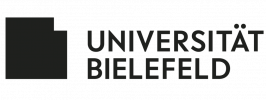
Offerings at the University of Bielefeld
Bielefeld University offers an MS in Intelligent Interactive Systems that includes lectures and seminars in artificial intelligence and autonomous systems engineering:
In-depth Machine Learning
Neurobehaviorial Biology
Introduction to Statistical Natural Language Processing
Applied Optimization
Hot Topics in Multimodal Behavior Processing
Cognitive Computing: Reasoning and Decision-Making under Uncertainty
Theory of Deep Neural Networks
Mobile Robots
Autonomous Robot Manipulation
RoboCup@Home ↗
As well as lectures and seminars in interaction technology:
- Representation of Linguistic Knowledge
Computer Vision
Foundations of Collaborative Robotics
Modeling Language Use with the Rational Speech Act Framework
Language Generation
Hot Topics in Interactive Cognitive Systems
Intelligent Tutoring Systems
Socially Assistive Robots: Theory and Practice

Offerings at the University of Bremen
The University of Bremen offers a new international Master’s program in „Artificial Intelligence and Intelligent Systems“ starting in 2024. At the moment, there are courses in cognition-enabled robotics:
As well as lectures and seminars in artificial intelligence and intelligent systems:
Lectures in machine learning:
And lectures and seminars in virtual reality and simulation:
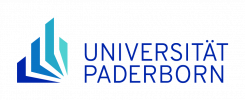
Offerings at the University of Paderborn
Paderborn University offers courses in Data Science with special focus on benchmarking platforms and natural language processing tasks:
PG: Vizualizing and Verbalizing Class Expressions ↗
PG: An extension of the GERBIL benchmarking platform ↗
Semantic Web ↗
- Natural Language Processing with Deep Learning, with open video lectures and course materials
As well as lectures about knowledge graphs:
Lectures in linguistics, developmental psychology, and educational science:
- Einführung in die Bildungswissenschaften (Introduction to educational science) ↗
- Einführung in die Entwicklungspsychologie (Introduction to developmental psychology) ↗
- Lernen und Entwicklung (Learning and development) ↗
- Sprache, Lernen, und technische Unterstützung (Language, learning, and technical support) ↗
- Erklären und (die Grenzen) der Erklärbarkeit (Explanation and (the limits of) explainability)
- Scaffolding aus psycholinguistischer Sicht (Scaffolding from a psycholinguistic point of view)
As well as lectures in digital ethics:
High school students
For high-school students studying computer science at school, or for those who are interested in studying computer science, psychology or a related field in the near future and would like to learn more about CoAI at an early stage.
SMILE WITH EASE
Smile with EASE offers workshops for high school students, and in particular girls and young women, who are interested in studying informatics, artificial intelligence, and robotics (part of the BMBF-funded project SMILE).
Girlsday/Future Day at the DFKI Bremen
The German Research Center for Artificial Intelligence (DFKI) Bremen, with the help CoAI JRC members Frank Kirchner and Rolf Drechsler, as well as the IAI and many other institutes at the University of Bremen participate in the Girlsday/Future Day with the research areas Robotics Innovation Center and Cyber-Physical Systems.
More offerings at the DFKI Bremen
They also offer an annual internship during the Bremen autumn vacations, as well as tours through the laboratories of the Robotics Innovation Center for school classes, and occasional opportunities for school internships.
University Lecturers
The IROS Workshop Everyday Activity Robot Manipulation in an Interactive Learning Environment brings together lecturers to exchange ideas on how to improve teaching in the field of cognition-enabled robotics.
General public
You would like to get a first idea about CoAI, or about the CoAI JRC team members and their research topics? These resources might be of interest for you:
TEDx Talk by CoAI member Rainer Malaka ↗ on Computer Games for a Better Life.
Axel Ngonga ↗ masters the Google Autocomplete Challenge at Paderborn University, answering the five most frequently googled questions about AI (in German).
Think Reactor is a computer science podcast on AI sponsored by DFKI Bremen ↗:
In this episode, CoAI JRC member Rolf Drechsler ↗ speaks about quantum computing and computer architecture.
Tanja Schultz ↗ speaks about Brain Computer Interface, Artificial Brains and AI in this episode.
If you would like to learn more about recent trends in robotics and society, you might like to tune in with this episode
with Frank Kirchner ↗.
Interview with Britta Wrede ↗ on Chances of Digitalization at the German Prevention Congress (in German).
Rolf Drechsler ↗ on Gaining Knowledge from Data at the Haus der Wissenschaft (House of Science) Bremen talk series “Wissen um 11” (in German).
The Bremen AI Transfer Center connects academia, companies, and society – anyone interested in AI is welcome to their offerings, such as the yearly Bremen AI Days with a variety of talks and workshops on AI (e.g. the IAI VR Expo, MUHAI by the team of Rainer Malaka, and many others).
The lecture series Co-constructing Intelligence features renowned experts on CoAI topics giving insights into their research to a broad audience.
Once a year, DFKI Bremen ↗ conducts an Open Campus to opens its doors to the public and introduce, among others, its Robotics Innovation Center (RIC) headed by CoAI member Frank Kirchner and the Cyber-Physical Systems Unit by CoAI member Rolf Drechsler. They also participate more regularly in the series Bremen Science Goes Public.
Every year, CoAI members from DFKI Bremen ↗ participate in an exhibition of the sponsors from the House of Science with exhibits and contributions
Universum® Bremen features are exhibits from the DFKI Robotics Innovation Center headed by Frank Kirchner, and in the technology exhibition of the Futurium in Berlin, you can visit RIC’s robot lady AILA.
CoAI Learning Hub
The CoAI Learning Hub is a collection of topic-specific learning resources offering open educational material created by CoAI JRC members for students from the fields or beyond.
The lecture series Co-constructing Intelligence connects all CoAI topics. It is jointly supported by the universities of Bremen, Paderborn and Bielefeld focuses on human-machine interaction and on how humans and machines can work together to acquire new knowledge and skills.
Cognition Enabled Robotics
The EASE Learning Hub
provides 57 video lectures, 7 software tutorials, and lecture slides from a variety of courses on AI-powered and cognition-enabled robotics.
Design and Implementation of Cognition-Enabled Robotic Systems
The open course is available through the nation-wide AI Campus Initiative.
Interactive Learning Environment for Cognitive Robotics (IntEL4CoRo)
An interactive introductory textbook on AI-powered and cognition-enabled robotics. The textbook is implemented using Jupyter Notebook technology.
It features video lectures, hands-on exercises and research-oriented training in virtual digital twin robot research laboratories, open knowledge bases representing robots, robot environments, and tasks, and collections of robot experiment data that robot researchers and students can scientifically work with.
Human Robot Interaction
Human-Robot Interaction — An Introduction
An open access textbook published by Cambridge University Press. Written by leading researchers in this developing field, this textbook is the first to provide a broad overview of the multidisciplinary topics central to modern HRI research.
Here students and researchers from robotics, artificial intelligence, psychology, sociology, and design will find a freely accessible electronic version of the textbook, as well as a massive open online course (MOOC), podcasts, and more.
Theory and Practice of Sociosensitive and Socioactive Systems
Interactive adaptive systems increasingly become part of our everyday life. Which factors could shape this development and under which conditions will interactions with technical systems be deemed socially appropriate?
This open-access book presents the FASA (Factors of Social Appropriateness) Model, which provides a structured approach to our understanding of social appropriateness in human-technology interaction, and serves to inform design choices for sociosensitive and socioactive artificial assistants. The book provides an overview of the FASA Model along with applications to different technical systems.
Actionable Knowledge Representation and Reasoning
Knowledge Graphs
An open access textbook that provides a comprehensive and accessible introduction to knowledge graphs, which are founded on the principle of applying a graph-based abstraction to data, and are now broadly deployed in scenarios that require integrating and extracting value from multiple, diverse sources of data at large scale.
This book is aimed at students, researchers, and practitioners who wish to learn more about knowledge graphs and how they facilitate extracting value from diverse data at large scale. To make the book accessible for newcomers, running examples and graphical notation are used throughout.
Github repository for Knowledge Graphs
Formal definitions and extensive references are also provided for those who opt to delve more deeply into specific topics, and example code and associated resources are available in the Github repository for the book.
Human-centric Artificial intelligence
Foundations for Meaning and Understanding in Human-centric AI is an open access introduction to meaningful AI, which investigates possibilities for constructing AI systems that rest on meaning and understanding. It includes a general introduction to the field, survey chapters on what understanding means in various human-centered research fields outside of AI, and discussion of key research topics for meaning-based human-centric AI. The book is accompanied with benchmarks that serve as learning exercises:
More Topics
You will find our current full collection of recommended textbooks and learning materials for cooperative and cognition-enabled AI and robotics in the CoAI JRC Learning Library.
In the ViB you can find textbooks and interactive learning materials created by members of the CoAI JRC for fields that are fundamental for research in cooperative and cognition-enabled AI, including cognitive robotics, knowledge representation, ontology-based interpretation of natural language, linguistic linked data, human-robot interaction, child language development, and much more.
